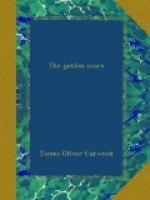With the going of the fire an utter and chaotic blackness shut him in. Feeling his way he crawled through the door of his tunnel, over the inside of which he had fastened as a flap his silk service tent. Then he stretched himself out in his sleeping-bag. It was surprisingly comfortable. Since he had left Breault’s cabin he had not enjoyed such a bed. And last night he had not slept at all. He fell into deep sleep. The hours and the night passed over him. He did not hear the wailing of the wind that came with the dawn. When day followed dawn there were other sounds which he did not hear. His inner consciousness, the guardian of his sleep, cried for him to arouse himself. It pounded like a little hand in his brain, and at last he began to move restlessly, and twist in his sleeping-bag. His eyes shot open suddenly. The light of day filled his tunnel. He looked toward the “door” which he had covered with his tent.
The tent was gone.
In its place was framed a huge shaggy head, and Philip found himself staring straight into the eyes of Bram Johnson.
CHAPTER VII
Philip was not unaccustomed to the occasional mental and physical shock which is an inevitable accompaniment of the business of Law in the northland. But never had he felt quite the same stir in his blood as now—when he found himself looking down the short tunnel into the face of the man he was hunting.
There come now and then moments in which a curious understanding is impinged upon one without loss of time in reason and surmise— and this was one of those moments for Philip. His first thought as he saw the great wild face in the door of his tunnel was that Bram had been looking at him for some time—while he was asleep; and that if the desire to kill had been in the outlaw’s breast he might have achieved his purpose with very little trouble. Equally swift was his observance of the fact that the tent with which he had covered the aperture was gone, and that his rifle, with the weight of which he had held the tent in place, had disappeared. Bram had secured possession of them before he had roused himself.
It was not the loss of these things, or entirely Bram’s sudden and unexpected appearance, that sent through him the odd thrill, which he experienced. It was Bram’s face, his eyes, the tense and mysterious earnestness that was in his gaze. It was not the watchfulness of a victor looking at his victim. In it there was no sign of hatred or of exultation. There was not even unfriendliness there. Rather it was the study of one filled with doubt and uneasiness, and confronted by a question which he could not answer. There was not a line of the face which Philip could not see now—its high cheek-bones, its wide cheeks, the low forehead, the flat nose, the thick lips. Only the eyes kept it from being a terrible face. Straight down through the generations Bram must have inherited those eyes from some woman of the past. They were strange things in that wild and hunted creature’s face—gray eyes, large, beautiful. With the face taken away they would have been wonderful.




